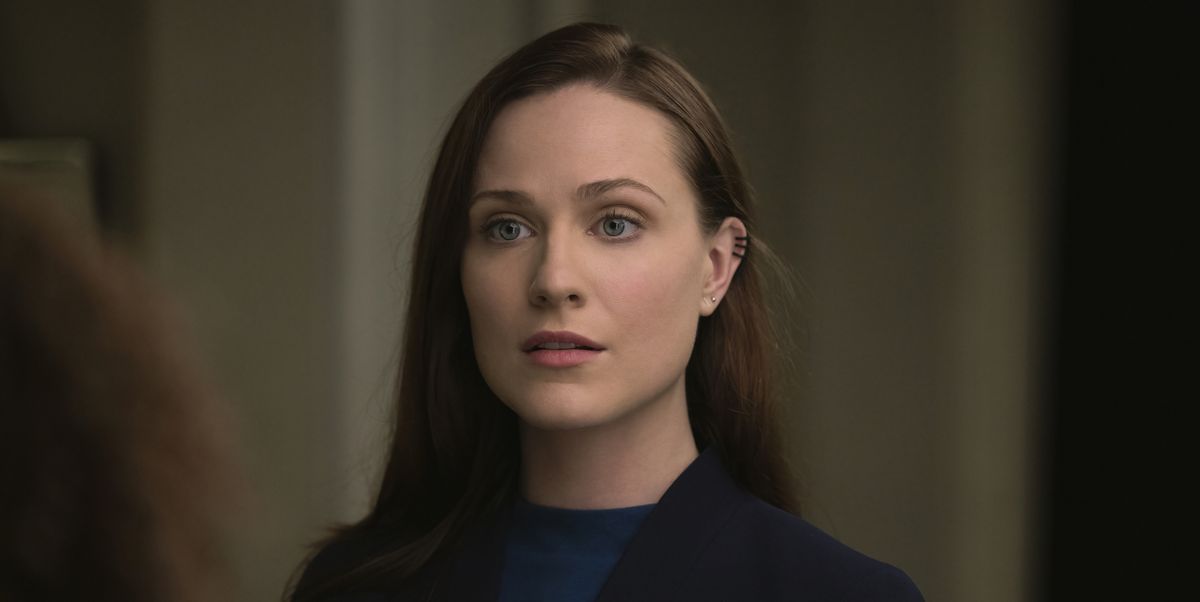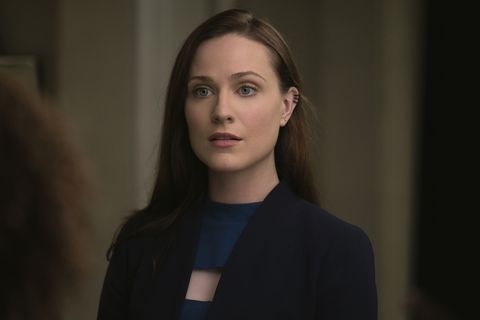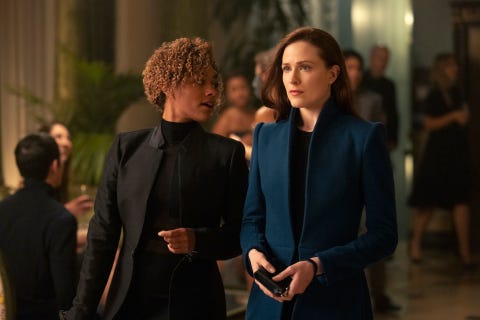Wait…that’s not Dolores.
When Evan Rachel Wood appears in Westworld season 4, she’s not playing her gun-slinging prairie girl-gone-rogue. (ICYMI, that woman—spoiler alert—perished at the end of season 3…or so we think.) This time, Wood plays Christina, a new character who couldn’t be any more different than her last. And it’s not just because her hair is deep auburn instead of blonde. So, what’s the new girl’s story?
Christina is painfully normal compared to Dolores. She has a 9-to-5 office job, a city apartment shared with a roommate (played by the very bubbly Ariana DeBose), and a monotonous morning routine. She dreads going on dates or going out at all, and, like most women, she’s exhausted by the dating scene. Christina works for a company called Olympiad Entertainment, where she writes stories for side characters in video games.
A romantic at heart, Christina can’t help but pitch hopeful, saccharine narratives despite her boss’s demand for dark and tragic stories. Alas, she appears to be a harmless dreamer. But danger lurks: Christina is pestered by an unknown caller, a mysterious man named Peter, who accuses her of ruining his life. “You made me do these things,” he tells her, implying that one of her stories is actually dictating the events in his life. At the end of the episode, Peter jumps off a building, hinting she was responsible for that. Do Christina’s stories in the game have some mysterious control over real people’s lives? And what will happen with her surprise savior, who stepped in at the end of this week’s episode?
We may find out as the new season unfolds, but until then, Wood and Westworld co-creator Lisa Joy break down our unexpected new leading lady.
Evan, who is Christina to you, and what was it like embodying her? Was it different from Dolores?
Evan Rachel Wood: It was very different. It was a completely different approach this season, because she’s very human and vulnerable and messy and imperfect and insecure and kind of nerdy. She’s got her routines. She seems like she’s a bit of a hermit, certainly nowhere near as self-possessed or as powerful as we’ve seen Dolores in the previous seasons.
Christina lives in her dreams inside of her head and she writes stories. But like Dolores, she notices something is off with the world, and she’s looking for an answer to a question that she doesn’t know yet. And so I think that’s really the only sort of bridge that she could have to Dolores. Otherwise, she’s completely new.
Lisa, what was your intention behind the character, somebody so different from who we’ve seen Dolores be in the past?
Lisa Joy: I mean, Dolores had evolved and changed so much already and kind of come to the end of her journey, but I think [finding] a lot of resolution and peace between these oscillations, between victim and perpetrator, and then finding this middle ground. We wanted to explore a totally different dimension to a character that Evan could play. And it was just so exciting to get to write this and see the sea change in Evan’s performance.
It’s an absolutely different character. And to see a new character in the same show has been amazing. It’s also been great being able to relate so viscerally to her character. This is a contemporary, relatable setting. I mean, for me, it was really interesting watching somebody play a writer.
Same here.
LJ: Right? And there is that thing, I don’t know if you have it too, where you’re writing, and I know for Evan, acting, you’re really imagining the internal lives of other people, and it’s an act of empathy and extension. But, ironically, sometimes you just feel like a vehicle for that, and it gets to be confusing, like, “Well, who is this entity here?” And I think that’s something that Evan’s new character struggles with.
I feel like this show always has a really interesting message or theme about free will, whether it’s for hosts or human beings. How did you want to explore that topic this season?
LJ: For me personally, the idea of whether we have free will is almost beside the point. I do think we have free will to a point. I do think a lot of things are set, but there are tiny ways we can distinguish ourselves. But I do think in terms of the philosophical questions of, “Do we have free will? Are we living in a simulation?” All these existential questions that people ask. I go back to the first season saying of, “If you can’t tell, does it matter?” I think it’s still incumbent upon us to act as though we have free will, to act with that responsibility, and to experience this existence as though we have volition and try to do the best and be the best people we can be.
How do you think Christina is handling all this? How is she navigating this strange mystery where someone confronts her about how her stories affect people in real life? It seems like it shakes her a little.
ERW: Absolutely. I think she spends the first half of the season confused and uneasy. And it’s also exploring this idea of this conspiracy theory culture that we’re in right now too, of: well, is it crazy to think that there are other things at play that we may not know about, or is it crazy to just blindly follow and trust that everything is fine? What actually is crazier?
I think we see her going down that rabbit hole that a lot of us are finding ourselves in these days of, “Wait a minute, is this thinking crazy? Or are these questions that I need to be asking myself?”
This interview has been edited and condensed for clarity.
This content is created and maintained by a third party, and imported onto this page to help users provide their email addresses. You may be able to find more information about this and similar content at piano.io


